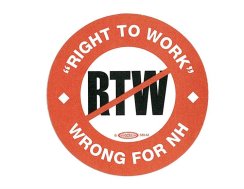“Right to Work” is Wrong for NH
NH Members, your friends and family in NH can use THIS LINK to look up your elected officials, and urge them to VOTE NO on Right to Work!

Despite the misleading name, so-called “right-to-work” laws do not guarantee anyone a job and do not protect workers’ rights.
“Right-to-work” laws prohibit trade unions from collecting fees to cover the cost of contract administration from employees who benefit from the protections of a collective bargaining agreement, but do not join the union. There are different versions of “right-to-work” legislation, but all so-called “right-to-work” laws are designed to limit the power of labor unions, and the workers they represent, to negotiate for better pay and working conditions.
Federal law requires trade unions to equally represent all workers covered by a collective bargaining agreement, regardless of union membership status. In states without so-called “right-to-work” laws, private employers and their employees are free to negotiate agreements that ensure everyone who benefits from a union contract contributes a share of the costs of obtaining and protecting those benefits. By prohibiting unions from asking non-members to pay a “service” or “fair share” fee to cover the basic costs of contract administration, so-called “right-to-work” laws give state governments the power to limit the terms and conditions that private-sector employers and their employees have a right to negotiate as part of a collective bargaining agreement.
Labor unions in “right-to-work” states are forced to absorb the costs of grievance and arbitration procedures on behalf of non-members who benefit from the terms of a bargaining agreement, but who do not contribute to the union’s operating fund. By draining resources and hurting the ability of unions to grow, “right to work” laws are consistently linked with lower average wages and reduced workplace safety for all working people in states that have passed the legislation.
Well-funded “right-to-work” proponents include the National Right to Work Committee, U.S. Chamber of Commerce, American Legislative Exchange Council (ALEC) and Americans for Prosperity. While supporters typically claim that “right-to-work” laws are necessary to attract new businesses and increase employment opportunities, rigorous economic studies fail to validate such claims.
FOR MORE INFORMATION:
NH AFL-CIO 2017 briefing pamphlet (PDF): Know the Facts About Right to Work
A Tale of Two States (and what it tells us about so-called “Right to Work” laws)
By Ross Eisenbrey and Teresa Kroeger, Economic Policy Institute, January 12, 2017
“Right-to-Work” States Still Have Lower Wages
By Elise Gould and Will Kimball, Economic Policy Institute, April 22, 2015

